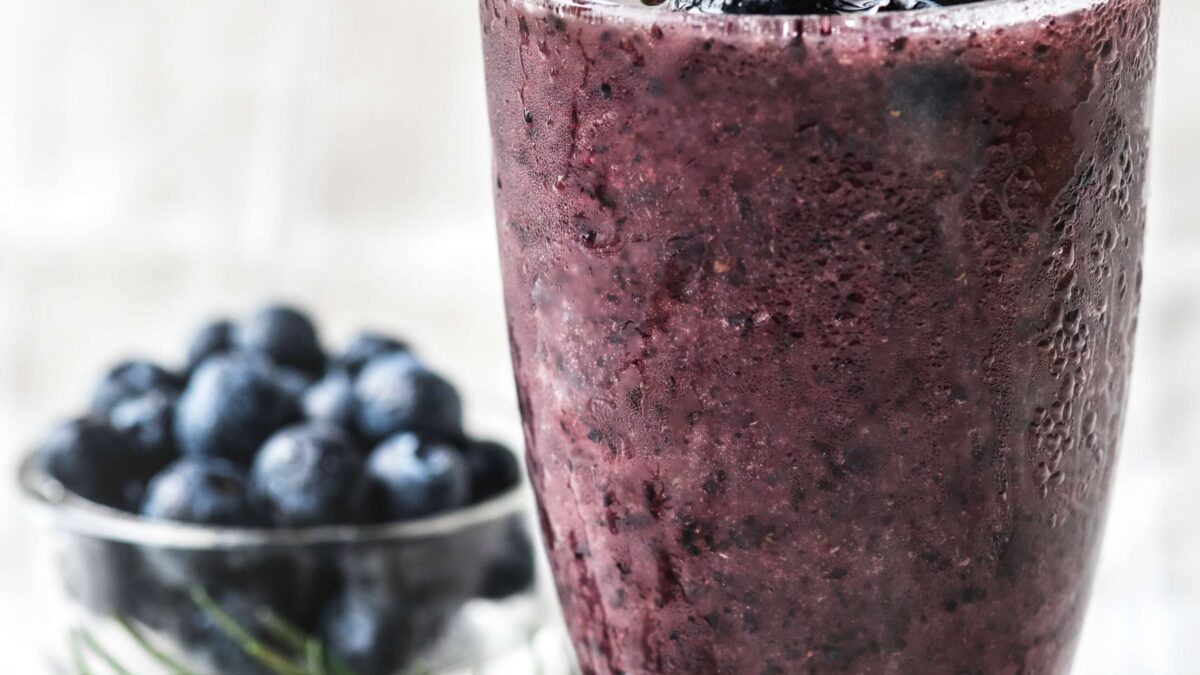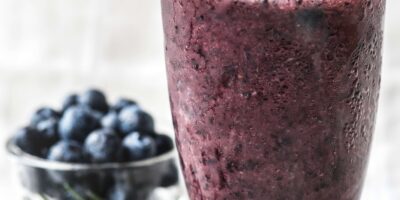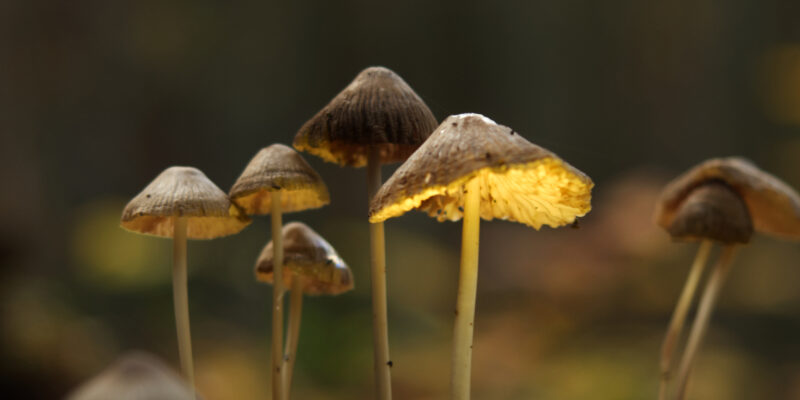
Introduction
The Magic of Mushrooms
Wondering why mushrooms have suddenly caught the world’s fancy? Well, it’s not only because they’ve made a splash in TV shows like ‘The Last of Us’ or because they play a vibrant part in our fairy tales – it’s because they’re packing a punch when it comes to our health and performance. From the spotted toadstools you find in storybooks to the simple button mushrooms in your salad, every variety is a tale of fascinating nutritional value. So, buckle up for this magical mystery tour into the world of mushrooms.
The Purpose of the Guide
The aim of this guide is simple: to help you unravel the mushroom’s mysterious layers. We’ll be navigating through the enchanting history of mushrooms, defining what makes a mushroom ‘functional’, and exploring different varieties and their health benefits. We’ll then delve into every budding mycologist’s favorite topic: mushroom nutrition. The guide also covers how to use mushrooms in your daily life, offers advice on buying mushroom products and answers the all-important questions that might be cropping up—just like a cluster of healthy shiitake. So, if you’re just a fun-guy or a fun-gal who loves to learn, this guide is your window into the spellbinding world of mushrooms.

Discovering Functional Mushrooms
What are Functional Mushrooms?
When it comes to fungi, not all are created equal. Functional mushrooms are the crème de la crème of the mushroom kingdom. These are distinct from your regular food mushrooms, as they contain compounds that are beneficial for health. Imagine mushrooms with superpowers that help with everything from cuddling your immune system to revving up your metabolism.
These pharmaceutical powerhouses have been used for thousands of years in both ancient Chinese and Ayurvedic medicine. More recently, however, they’ve been turning heads and making waves in the health and wellness sector. You’ll find them showing off in coffee, smoothies, supplements, and so much more! Just a note, these nutritional nuggets are not the psychedelic kind. So, no need to worry about any ‘trippy’ side effects.
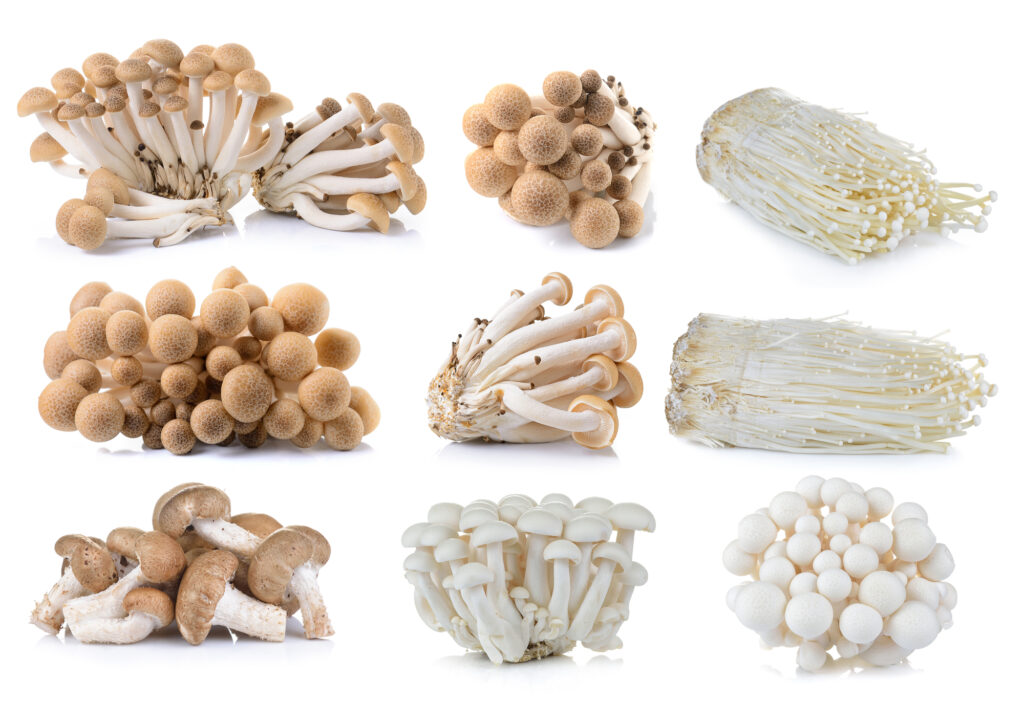
History of Mushroom use
Mushrooms are not newcomers to the wellness party. Otzi, an ancient man who lived around 3300 BC, carried two different species of mushrooms in his pack – Tinder Fungus for starting fires and Birch Polypore, a medicinal mushroom known for its anti-parasitic properties. This tells us that even 5000 years ago, people recognized and utilized the power of mushrooms.
Mushroom use wasn’t confined to the alps. Eastward, mushrooms were an integral part of Traditional Chinese Medicine. Respected for their pharmaceutical properties, the Reishi mushroom, known as ling-zhi, was dubbed the “Mushroom of Immortality”. Talk about VIP treatment!
As we journey on, we see that the use of medicinal mushrooms wasn’t a passing trend. Whether it’s Otzi’s survival pack or the royal courts of ancient China, mushrooms have held their own and today, they’re still our allies in attaining a healthier, happier life.
Mushrooms have been our allies in health for thousands of years, from the Alps to Ancient China.
Types of Medicinal Mushrooms
Lion’s Mane
Lion’s Mane is a superstar in the functional mushroom lineup, named for its fluffy appearance – cascading white tendrils that are evocative of a lion’s mane. But it’s not just about the looks for this fungi. Lion’s Mane is well-known for its cognitive supporting compounds, including hericenones, that boost the body’s production of nerve growth factors (NGF), contributing to better brain function and neurological health.
Why is Lion’s Mane on our top list?
- Brain Health: This mushroom is a personal trainer for your brain, stimulating brain cell growth and potentially lessening symptoms of degenerative diseases like Alzheimer’s.
- Mental Health: It doubles as a cheerleader too, reducing symptoms of anxiety and depression.
- Stress Management: Lion’s Mane also moonlights as an adaptogen, helping your body manage occasional stress. Suddenly, that looming Monday presentation doesn’t seem so scary!
But it’s not all sunshine and rainbows. Some people might experience mild side effects like an upset stomach. Also, this mushroom may not mingle well with blood thinning medications. Always a good idea to consult with a healthcare provider before introducing a new supplement into your routine.
Who should use Lion’s Mane? Pretty much anyone looking to guard their gray matter and keep their nerve cells fit and happy!
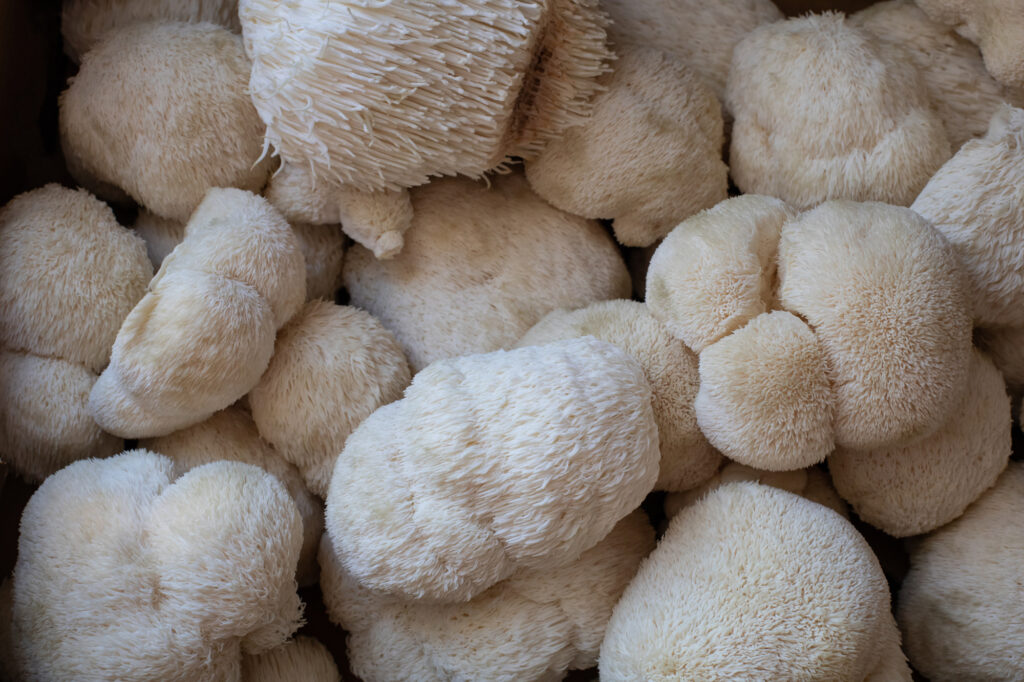
Chaga Mushroom
Chaga, also known as “diamond of the forest”, is a dark, blackjack fungal growth found on birch trees. But don’t let this burnt charcoal look-a-like fool you. Beneath that coarse exterior lies a treasure trove of vital nutrients and bioactive compounds.
Why Chaga made our top list:
- Immunity Booster: Resembling a fighter pilot, Chaga deploys special proteins (cytokines) to stimulate white blood cells, boosting our immune system to fight off those pesky germs.
- Glowing Skin: Beauty enthusiasts, rejoice! Chaga’s high melanin content along with its antioxidant capabilities fight free radicals and UV damage, offering skin, hair, and nail enhancing benefits.
- Anti-Aging: This mushroom tantalizingly offers the elixir of youth with its anti-aging properties.
- Blood Sugar Regulator: This earthy wonder also reaches out to our diabetic friends by maintaining blood glucose levels.
While Chaga seems to have a lot going for it, its high oxalate content may not play well with those on a low-oxalate diet. And, as it can potentially lower blood sugar, those on diabetic meds should check with a doctor before using.
So, who’s this for? If you’re looking for a sure-fire way to boost your immune health, beautify your skin or manage your blood sugar levels, Chaga might just be your new best fungal friend.
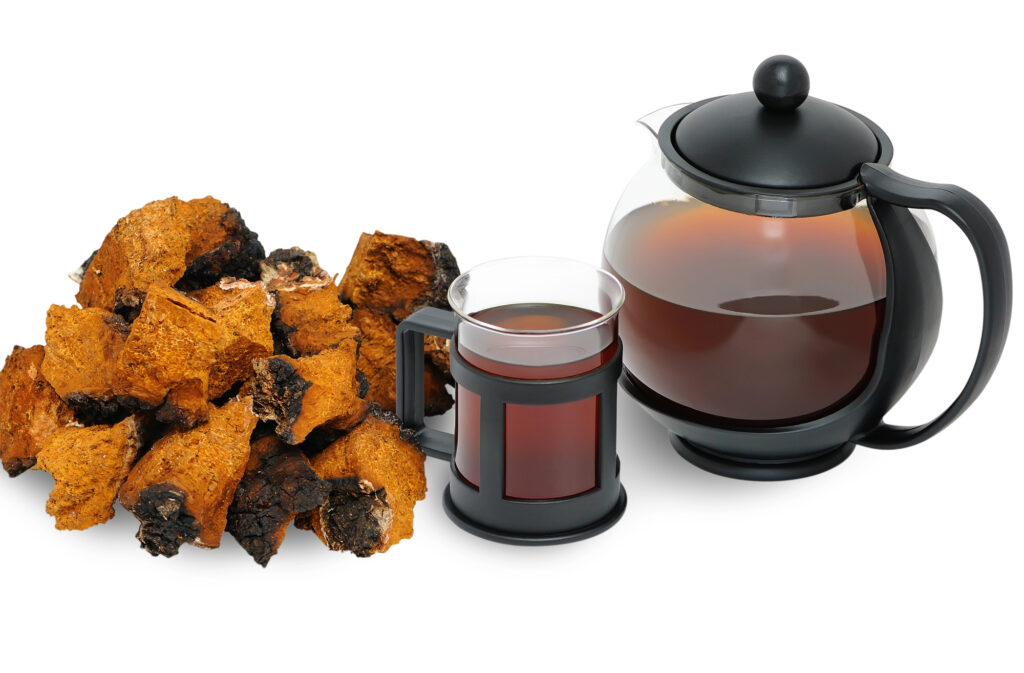
Cordyceps Mushroom
Here’s where we introduce the rockstar of athletic endurance–the Cordyceps mushroom. This amazing fungus is like the performance-enhancing protein shake of the supplemental world, without any nasty side effects. Its history is certainly unique, originating from high mountain regions, it traditionally grew on insect larvae.
The Cordyceps’ chart-toppers:
- Enhanced Endurance: Cordyceps can turn you into the energizer bunny, improving athletic performance and reducing fatigue.
- Immune Support: Cordycepic acid and cordycepin, unique to this mushroom, aid in boosting your immune system.
- Anti-Aging: It lends a hand in your battle against the clock, slowing the aging process with its antioxidant properties.
Like most good things, Cordyceps should be used sparingly and wisely. It might lower blood sugar too much in people with diabetes and affect blood clotting, so talk to your healthcare provider if you’re on any medication or have any health conditions.
Cordyceps is for the runner looking to shave a few seconds off their time, the biker who dreams of effortlessly reaching the summit, or simply anyone looking to feel more refreshed and alive throughout the day.
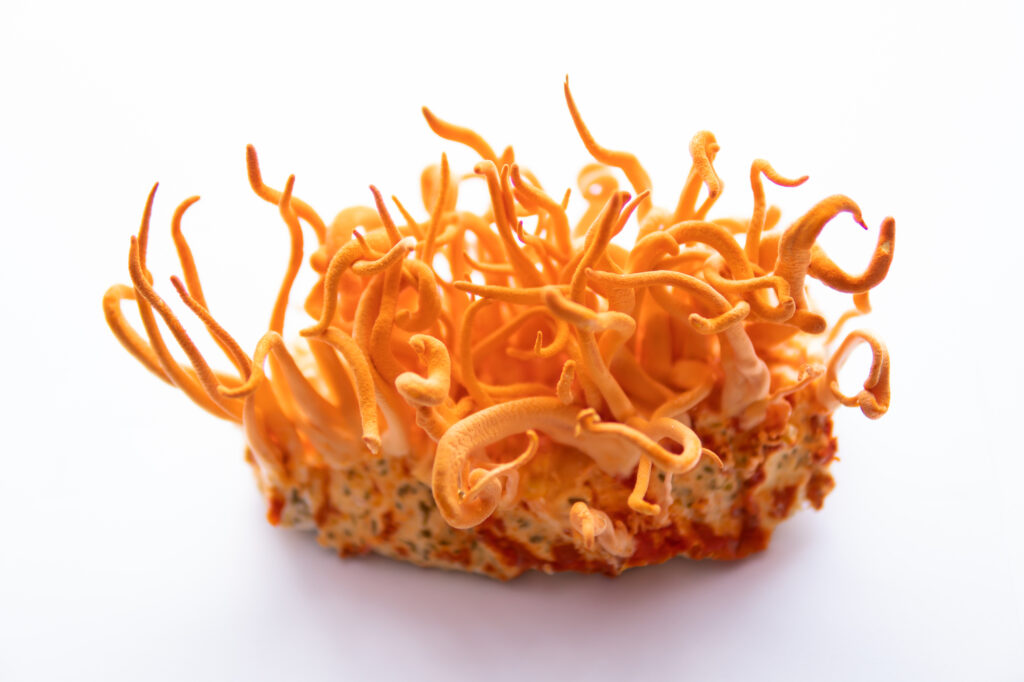
Turkey Tail Mushroom
This next fungi, fondly named Turkey Tail for its similarities to a fanned-out turkey’s tail, isn’t ruffling feathers just because of its appealing wave of colors. It’s truly the ultimate superfood, renown for the beneficial polysaccharides, like PSK (Polysaccharide-K) and PSP, it contains that aid in bolstering immunity and gut health.
Why Turkey Tail deserves a standing ovation:
- Immune Support: PSK found in Turkey Tail mushrooms may help in stimulating the immune system, especially beneficial for patients undergoing chemotherapy.
- Gut Health: PSP is like the BFF of gut bacteria, promoting healthy gut microbiota.
- Liver Health: Turkey Tail can be liver’s lifesaver as it helps in detoxification and offers antioxidant support to this precious organ.
Small caution that you won’t be finding the equivalent of PSK as used in cancer treatments in Turkey Tail supplements. Also, some people may experience mild digestive upset.
Turkey Tail is perfect for the individual aiming for a rock-solid immune system, improved gut health, or a happier liver.
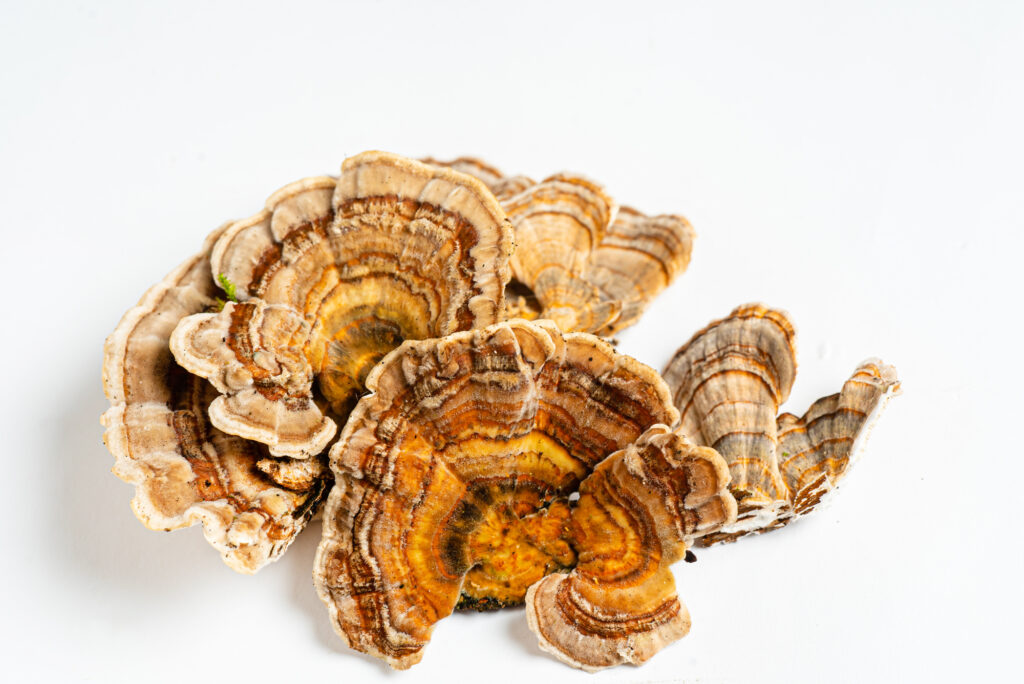
Maitake Mushroom
Let’s move onto the Maitake, an ode to the mesmerizing forest dance during autumn. Also known as the “hen-of-the-woods”, Maitake mushroom’s superpower lies in its ability to support our immune system and manage stress. It’s a resourceful fungus, promoting our body’s overall function through amino acids while maintaining heart and bone health through beta-glucans.
Here’s why Maitake deserves a curtain call:
- Immunity Booster: Maitake champions the stimulation of immune cells like lymphocytes and natural killer cells, leading to a more robust immune reaction.
- Stress Management: Ayurveda fans will love Maitake, which is a known adaptogen, supporting our bodies to stand tall against the winds of stress.
- Weight Management: True to its hen-like appearance, Maitake watches over our weight like a mother hen, aiding digestion and facilitating weight management.
Beware of its power though. Maitake might lower blood sugar way too much for people with diabetes. Always good to check with a doctor if you’re on any medication or have any health conditions.
The Maitake mushroom is a great choice for those seeking to fortify their immune system, manage their stress levels or just keep their weight in check.
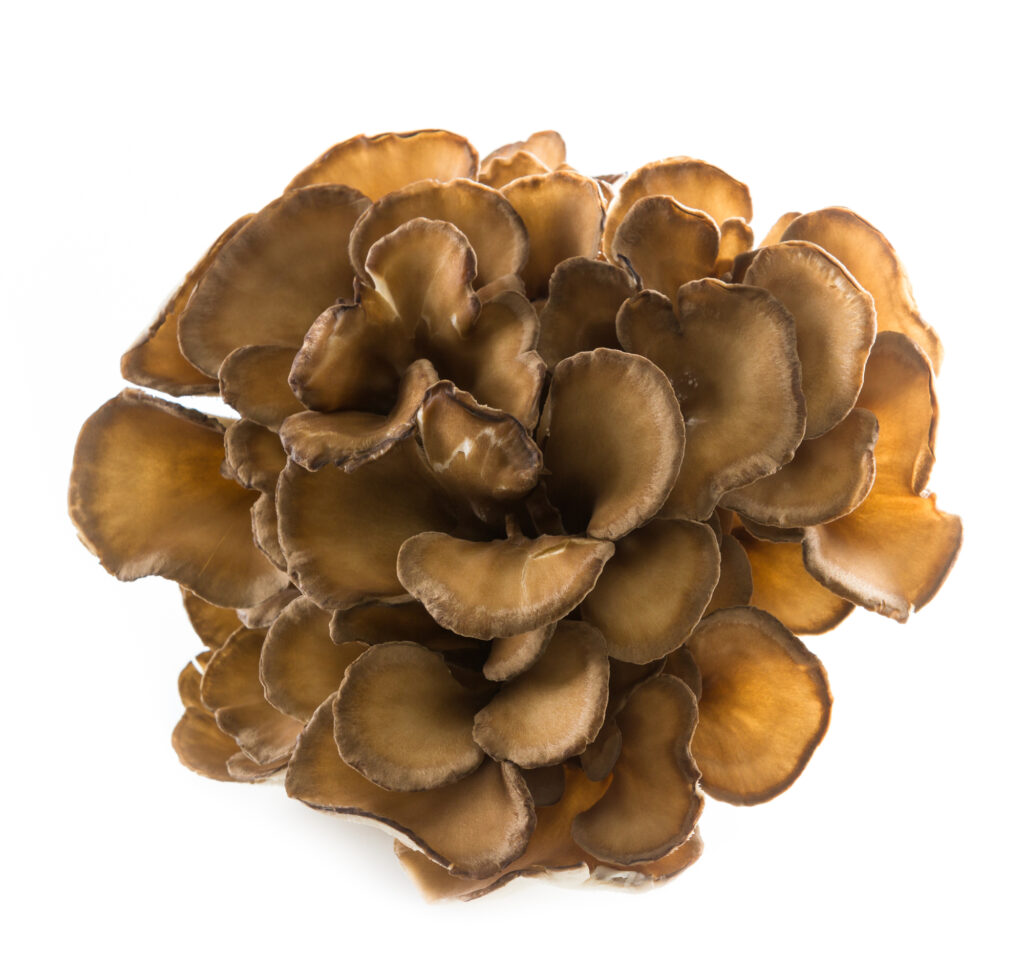
Reishi Mushroom
Now, enter the Reishi mushroom, a nickname like “The King of Mushrooms” means it’s got a lot to live up to! This shiny, red, kidney-shaped fungus is more than just a pretty face. Packed with ganoderic acids, it supports and protects the liver, aids in detox, and eases your mind before bedtime.
Reasons why Reishi is royal:
- Liver Support: Reishi safeguards your liver, protecting it and aiding in detoxification.
- Sleep Aid: Known for its soothing and sleep-enhancing effects, it’s like counting sheep but better.
- Mood Enhancer: This King Mushroom is also a king of hearts, promoting relief and mood enhancement for people dealing with anxiety or depression.
But remember, even kings have their drawbacks. Reishi should not be used long term as allergic reactions may develop. Its side effects might include dryness in the mouth, itchiness, and rash.
Who’s Reishi for? If you’re dealing with sleep issues, looking for a mood booster, or giving your detox routine a kick, then welcome this king into your realm.
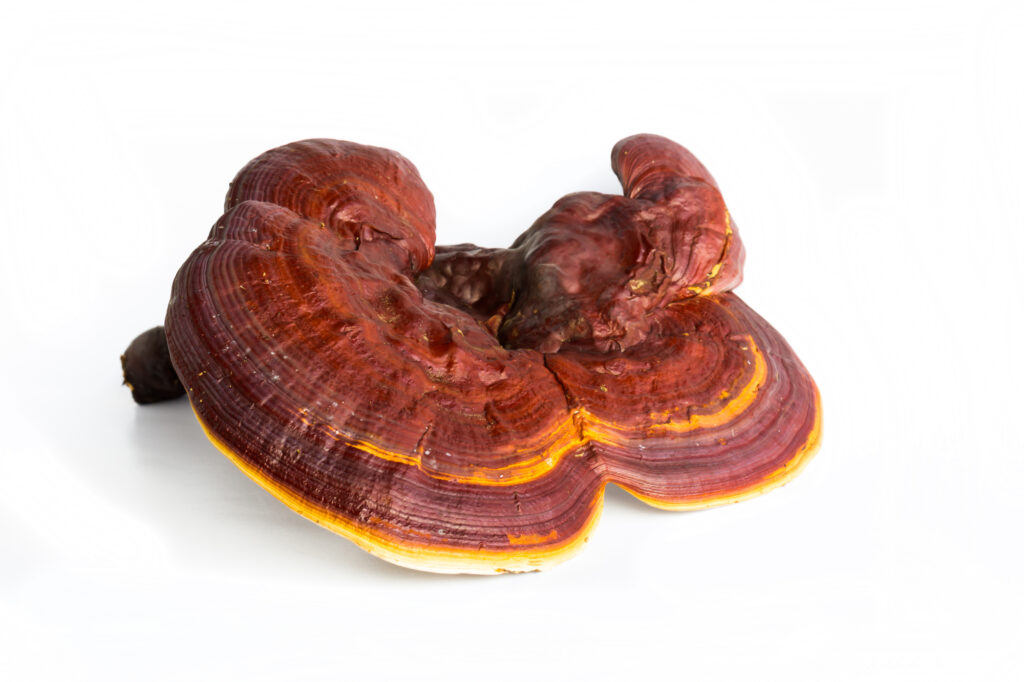
Shiitake Mushroom
Meet Shiitake, the celebrity chef of mushrooms, not only flaunting its deeply umami taste in culinary dishes but also renowned for the large quantity of healthful compounds it presents. Shiitake’s superpowers are diverse, from sustaining skin health, heart health to constructing an awesome immune fortress.
Why Shiitake is showing off:
- Healthy Skin: Rich in polysaccharides, Shiitake helps manage your body’s occasional stress response, leading to better skin health.
- Heart Health: Filled with B vitamins, Shiitake does wonders to your heart health, and even your cholesterol levels might start doing the happy dance.
- Immunity Builder: Offering 1,3 1,6 beta glucans, Shiitake supports the production of white blood cells, turning your immune system into a powerhouse.
While Shiitake is generally well-tolerated, some people might experience skin rashes, digestive problems, or increased sunlight sensitivity. As always, check with your healthcare provider before introducing anything new into your health regime.
So, if you’re looking to boost your skin health, protect your heart, or wire up your immune defense better, Shiitake is a top choice.
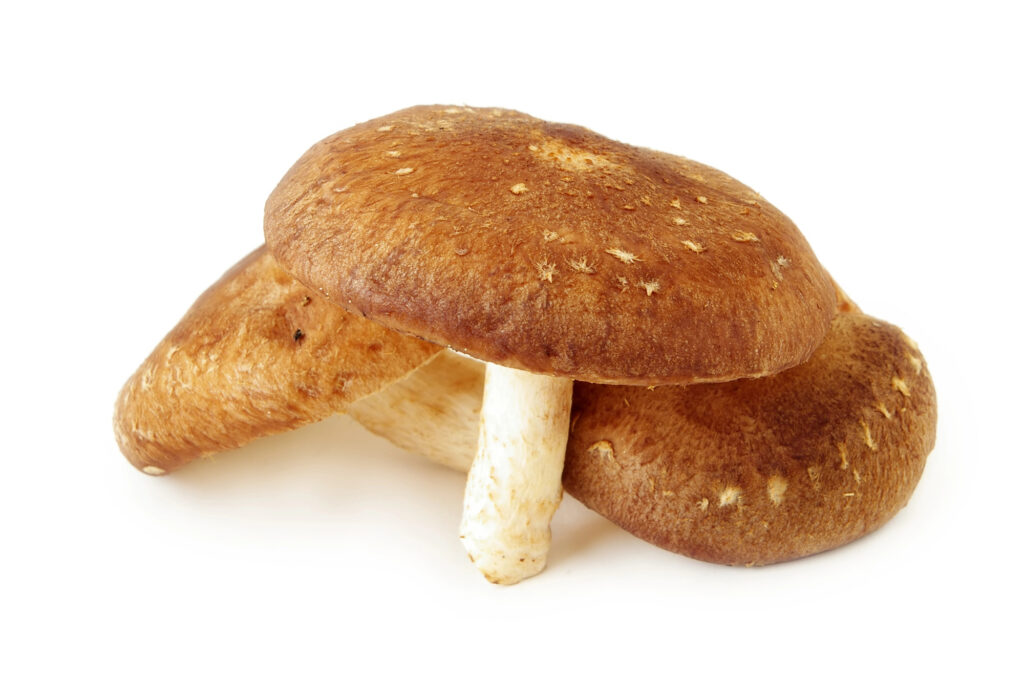
Tiger Milk Mushroom
Now, step into the world of the Tiger Milk Mushroom, an enigmatic marvel often hailed as “The Hidden Jewel of the Forest.” This elusive, creamy-white mushroom, resembling a tiger’s milk, is not just a sight to behold. Rich in polysaccharides and peptides, it’s a champion for respiratory health, boosts immunity, and is a source of calmness in your hectic life.
Why Tiger Milk Mushroom stands out:
- Respiratory Relief: It’s a breath of fresh air for your lungs, offering relief and supporting respiratory health.
- Immune Booster: Fortifying your body’s defenses, it’s like having a personal health shield.
- Stress Reducer: Amidst life’s storms, it’s your serene sanctuary, offering peace and reducing anxiety.
However, every gem has its flaws. The Tiger Milk Mushroom should be used judiciously as it may not suit everyone, and its effects can vary.
Who’s the Tiger Milk Mushroom for? If you’re navigating through respiratory challenges, seeking to strengthen your immune system, or yearning for a haven of calmness, this forest jewel awaits your discovery.
Delving Deep into the Benefits
Boost Your Energy Naturally with Mushrooms
Looking to rev up your internal engine and conquer the day? Lace up your boots and let’s journey through the mushroom kingdom of energy boosts! Mushrooms like Cordyceps and Shiitake are like the Red Bulls of the plant kingdom, except they’re all-natural, and they won’t leave you hitting the rocks after a caffeine induced high.
How do they do this magic?
- Adaptogenic Powers: Mushrooms like Reishi are known as adaptogens – a wonder of nature that helps balance the body’s natural response to stress and boosts energy without over-stimulating.
- Nutritional Components: A gift of Vitamin B from Shiitake means it assists the body in converting food into energy. That’s your body getting a fuel rehaul, showing off its energy management prowess.
- Cordycepin Factor: Cordyceps also contains a compound known as cordycepin, which contributes you instant fuel without any need for conversion.
Mushrooms for Immunity
Your immune system is like your body’s personal superhero. And, to maintain top-notch superhero performance, it needs a formidable sidekick. Enter stage right: the humble mushroom.
Mushrooms like Shiitake, Reishi, and Turkey Tail are loaded with compounds known as polysaccharides. They work like an alarm bell, alerting your immune cells when an unwanted guest tries to crash the party. They also serve as raw material for special proteins (cytokines) that rally the troops (white blood cells), helping fortify your immune defense, making it a fortress.
Shiitake, Cordyceps, and Chaga’s beta-glucans modulate the immune system, which means they help balance it – not too hyper, not too dormant, just right. Puppeteers of your immune function, if you will.
Understanding Mushroom Nutrition
Beneficial Compounds in Mushrooms
Our mushroom story doesn’t end at their immune-boosting superpowers or their energy-enhancing abilities. It’s time to zoom into the magical world of beneficial compounds found in mushrooms that make them such health warriors in the first place.
- Beta-D Glucans: These are well-known polysaccharides. Think of them like long chains of sugar molecules that stimulate our immune system. They’re immunomodulators, meaning they balance our immune function – not too overactive, not too lazy, just right.
- Sterols: Fungal sterols like ergosterol are anti-aging warriors. When exposed to UV light, they’re converted into Vitamin D2 – a bona fide sunshine vitamin!
- Terpenoids: These fat-soluble compounds are celebrated for their antiviral and anti-inflammatory properties. They’re like the bouncers at the club of your body, flushing out unwanted guests like harmful germs and inflammations.
With all these compounds to offer, mushrooms are like the Picasso of cellular interaction, harmoniously playing with colors of our bodily structures and functions to create a vibrant mural of health and wellbeing.
How to Boost Daily Nutrition With Mushrooms
So, now that you are familiar with functional mushrooms, you might be wondering, “How can I include these nutritional powerhouses into my daily routine?” Well, my mushroom enthusiast friend, here are some creative ways:
- Mushroom Powder in Morning Smoothies: Kickstart your day with a protein shake or energy juice, jazzed up with a scoop of mushroom powder. It’ll rev up your engine for the day and ensure you’re packed with a boost of essential nutrients before you even leave the house.
- Coffee and Tea with Mushrooms: Try adding some mushroom blend to your regular cup of joe for a nutrient-packed coffee, giving you both the caffeine kick and an overall health boost. Or, for the tea enthusiasts out there, consider mushroom tea for a cozy evening wind-down.
- Mushroom-Spiked Snacks: Love protein bars? Recreate them at home, this time with a dose of nutrient-rich mushroom powder. Your snacking breaks won’t just be about satisfying your sweet tooth, but also ensuring you get a healthy energy dose.
- Mushroom Supplements: If cooking or whipping up a tea or a smoothie isn’t your thing, then mushroom capsules are a convenient and effective option.
Decoding Myths and Precautions
Are Functional Mushrooms Safe to Consume?
One question that naturally springs to mind as you delve into the world of functional mushrooms is: “Are they safe?” Well, breathe easy. Most functional mushrooms are very safe to consume. Of course, everything has its limit, and an overdose can occasionally lead to unwanted consequences, like suppression of the immune system.
Most functional mushrooms are not meant to be eaten raw but are best enjoyed when appropriately processed. They can be ingested as capsules, in powdered form, or even as a tincture. You can also seamlessly blend them in your coffee, tea or smoothies for a daily health-boost.
As a safety measure, it’s always a good idea to consult your healthcare provider before supplementing with functional mushrooms, especially if you have any existing medical conditions or if you’re pregnant. In a nutshell, with responsible use, functional mushrooms can be a safe, potent addition to anyone’s wellness routine.
Dosage Recommendations
Talking about safety lands us nicely onto the topic of dosage. The amount you take will depend on the mushroom form you choose, so always check the label for adequate dosage. For instance, with our hot water extracts, we recommend starting with 1 gram per day.
There are parameters to consider like your current health condition and the specific benefit you hope to gain, which could warrant an adjusted dosage. For example, while a healthy individual might reap desired benefits with a dose of 1-2 grams per day for immune, cognitive and energy boosting; specific health conditions might require higher doses, up to 9 grams per day in certain cases.
As always, a natural health practitioner or other healthcare provider can assess your specific needs, thus offering a plan that works for you. Start slow, listen to your body, keep your healthcare provider in the loop, and you are all set to start your mushroom journey!
Best Time to Take Mushrooms
Wait, there’s a best time to take mushrooms? The clock surely doesn’t tick differently in the mushroom kingdom. Based on our research, it doesn’t seem to dramatically matter when in the day mushrooms are consumed. Their benefits work over extended periods of consistent usage, irrespective of what the clock reads.
However, with mushrooms like Cordyceps that have stimulating effects, it might be wise to consume them during the day to avoid interrupting your nightly zzz’s. On the flip side, Reishi, which promotes relaxation, might be most beneficial when taken before bedtime.
Like any supplement, consistency is key. And remember, everyone’s metabolism is unique – what works for Cinderella might not work for you. So, observe, experiment, and find out what floats your boat!
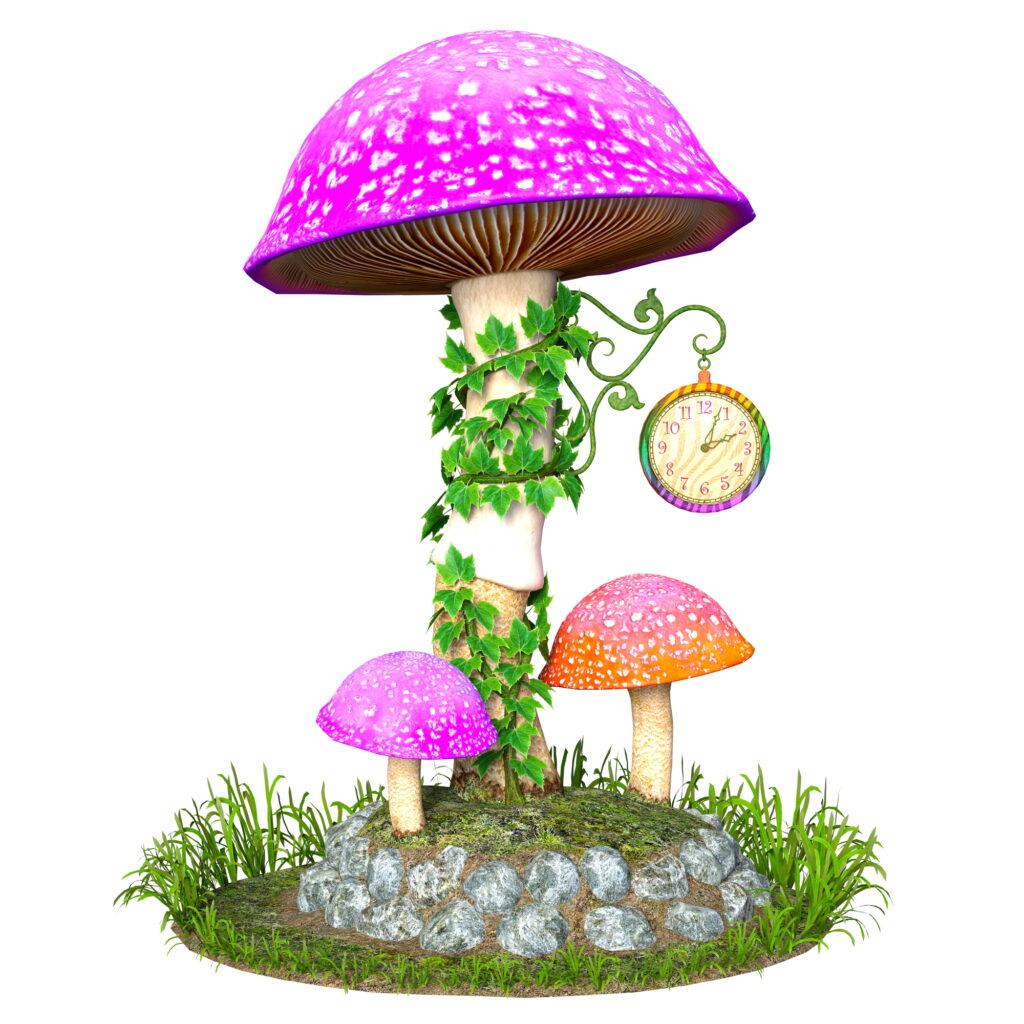
Buying and Using Mushroom Products
What to Look for When Buying Mushroom Products?
Ready to stock up on these mushroom marvels? Awesome! But hold your horses. Not all mushroom products are created equal. Here are some handy tips to make sure you select the best:
Choose Extracts Over Powder: Supplements containing mushroom extracts are generally more potent than those containing mushroom powder. They’ll deliver more of the beneficial compounds you’re after. Look for “hot water extracted” on the label or company website.
Check for Fillers: Nobody likes cheap fillers, right? Make sure you get 100% mushroom product. Some supplements can be filled with just 5% of the beneficial mushroom and 95% rice flour (or similar). Stick to products that ASSERT their 100% mushroom claim.
Look for Active Compounds: Ensure your supplement highlights the presence of active polysaccharides or triterpenoid compounds. Avoid supplements that are void of beta-glucan – this gives the mushroom much of its medicinal quality.
No to Mycelium: Keep an eye out for products that boast of mycelium. Mycelium based products are not as effective as they are void of the super beneficial beta-glucan.
With these pointers in check, you’re now a certified mushroom shopping expert. So, jump into the wild mushroom marketplace with confidence!
Extraction Methods Used in Mushroom Products
Understanding extraction methods can seem a little like mushroom mysticism. But don’t worry, it’s not as complicated as it sounds! In simple terms, extraction is breaking down the cell walls of a mushroom to make its beneficial constituents more bioavailable. Hot Water and Alcohol are the two main types of extractions used in mushroom products.
Hot Water Extraction: This is the traditional way of processing medicinal mushrooms. The mushrooms are broken down into smaller pieces, steeped in hot water for several hours. The liquid obtained is then spray-dried and turned into a neat powder. This method particularly reels in water-soluble compounds like beta-d glucan.
Alcohol Extraction: For compounds such as triterpenes and sterols that are not soluble in water, the mushrooms are soaked in alcohol. The soaked mixture is then evaporated to get a concentrated extract.
Some processes utilise a combination of both methods, known as dual extraction. So next time you’re buying a mushroom product, look for a ‘dual extraction’ claim on the label/libation to ensure you’re getting the optimal mix of constituents.
FAQs
Which Functional Mushrooms are Most Beneficial?
You might be expecting the answer to be a certain single mushroom – a superstar of the fungi world, right? However, the beauty of the mushroom kingdom lies in its diversity, each offering a unique mix of benefits. For example, Lion’s Mane is excellent for mental clarity and nerve health. Reishi can usher in relaxation and support liver health, while Cordyceps is all about providing that energy boost.
Simply put, it’s not really about finding the “most beneficial” mushroom, but more about selecting the right mushroom that aligns with your unique health goals.
Do you Need to Work with a Doctor to Use Functional Mushrooms?
Do you need a doctor to eat an apple? Not really, but if you have health issues or allergies, it’s always prudent to talk to your healthcare provider. The same goes for functional mushrooms. While they are generally safe and side effects are rare, if you have an underlying condition, are pregnant, nursing, or on medication, you should definitely consult with your healthcare provider before adding them to your regime. Consultation keeps you safe and helps you utilise the benefits of mushrooms optimally!

